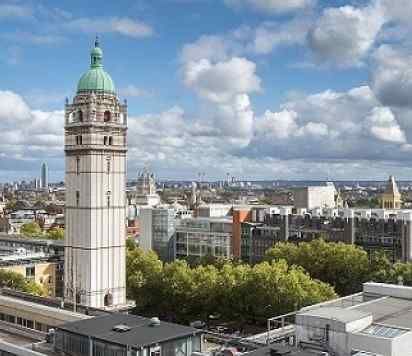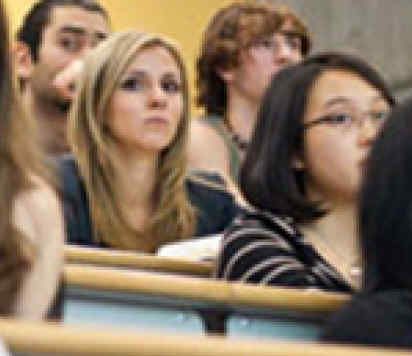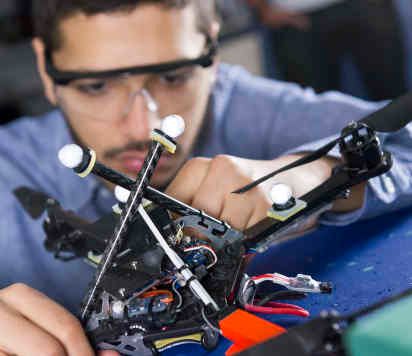We have provided some of our Frequently Asked Questions around admissions and studying on the MEng Aeronautical Engineering degrees. You can also find general admissions FAQs on our Admissions Help Centre. Our student terms and conditions also has more important information that you will need to be aware of prior to becoming a student at Imperial.
You can view Imperial’s Academic Policy with regards to admissions on our Academic Governance webpages.
Before you apply
What does MEng mean?
An MEng stands for a Master of Engineering, and is typically used for undergraduate degrees that include an integrated Master’s year. Along with a number of other top engineering institutions in the UK, we no longer offer a three-year Bachelor of Engineering (BEng) course
What undergraduate degree courses do you offer and how can I apply?
We offer five MEng Undergraduate degrees — all students follow a common programme of study for the first two years.
- H401: Aeronautical Engineering (4 years)
- H410: Aeronautical Engineering with a Year Abroad (4 years)
- H411: Aeronautical Engineering with a Year Abroad (5 years)
- H415: Aeronautics with Spacecraft Engineering (4 years)
- H420: Aeronautical Engineering with a Year in Industry (5 years)
You can find the typical structure for each of our MEng undergraduate degrees on the course webpages:
All students must initially apply for the H401 MEng in Aeronautical Engineering.
How do I transfer to the Aeronautical Engineering degrees with a Year Abroad, Year in Industry or with Spacecraft Engineering?
All students start on the H401 Aeronautical Engineering degree. If you are on target to achieve a 2:1 or above, you may apply to transfer to our Year Abroad, Year in Industry or Spacecraft Engineering pathways. Transfers to the Spacecraft Engineering pathway takes place after the second year and transfers to the Year Abroad and the Year in Industry options take place after the third year.
H410 and H411: Year Abroad
Students on target to achieve a 1st by the end of the second year will be eligible for placements in the USA or Singapore. Students on target to achieve a minimum 2:1 by the end of the second year will be eligible for placements in Europe.
H420: Year in Industry
Students on target to achieve a minimum of a 2:1, and who have organised a suitable industry placement, may transfer to our Year in Industry study stream.
H415: Aeronautics with Spacecraft Engineering
Students who wish to transfer to this curriculum must undergo a separate round of evaluation of their results and interest in the programme.
How do I apply?
All applications must be made via the UK government body UCAS. Further information can be found on the College's Application Process webpages.
Do all students initially apply for the H401 MEng Aeronautical Engineering?
Yes, our students apply for the H401 MEng Aeronautical Engineering and follow a common programme of study for the first two years, after which it will be possible to transfer to our Year Abroad, Year in Industry or Spacecraft Engineering pathways.
Do you offer a BEng Aeronautical Engineering degree?
We do not offer a BEng Aeronautical Engineering degree, all students will study MEng Aeronautical Engineering.
What are the entry requirements?
We accept a wide range of academic qualifications from all over the world and our entry requirements can be found on our course webpages:
In addition to our minimum academic requirements:
- For students wanting to transfer to the H410 Year Abroad course in Europe, a minimum of grade B at GCSE in French or German is required.
- English language requirements apply to entry into our MEng Aeronautical Engineering courses; you can find the accepted tests and minimum grades on our English language requirements webpages. For MEng Aeronautical Engineering, we ask for the standard level of English.
- A high level of secondary school Mathematics and Physics is mandatory. Further Mathematics is highly recommended but not mandatory for admission to our courses.
Foundation programmes
We currently only accept the following Foundation programme qualifications:
- UCL Undergraduate Preparatory Certificate for Science and Engineering (UPCSE)
- Warwick International Foundation Programme in Science and Engineering (IFP)
If you are studying one of these Foundation programmes, you can find the minimum entry requirements on our course webpages.
What if my qualifications are not listed on the course page?
If your high school or other qualifications are not listed on our course pages, we recommend you contact our Engineering Admissions team for advice on eligibility prior to making an application: engineering.admissions@imperial.ac.uk.
What are the English language requirements?
English language requirements apply to all courses and you can find a list of accepted tests and our minimum entry requirements on our English language requirements webpages. For MEng Aeronautical Engineering, we ask for the standard level of English.
What are the fees?
Our tuition fees can be found on our Course webpages:
Your fee status will be assessed by Imperial once a UCAS application has been received. You can find further guidance on how we assess fee status on our fees and funding webpages.
Is any financial support available?
Bursaries and Loans
Imperial offers a means-tested Imperial Bursary worth up to £5,000 per year for home students who are eligible for student funding from the government. You can find out more about the eligibility criteria on our Fees and Funding webpages.
Support for home students is also available through Government funding options including the Tuition Fee Loan and Maintenance Loan
Scholarships
The Department of Aeronautics currently does not offer any undergraduate departmental scholarships. However, you may be eligible for other undergraduate scholarships offered by Imperial such as our IB Excellence Scholarship. You can find a list of scholarships and eligibility on our scholarships search tool.
What is the difference between the H401, H410, H411, H415 and H420 courses?
All students initially apply to the H401 MEng Aeronautical Engineering course and follow a common programme for the first two years. Transfer to the H410 Year Abroad (four-year degree), H411 Year Abroad (five-year degree), and H420 Year in Industry programmes occur at the end of the third year.
Students wishing to complete a Year Abroad in France or Germany must demonstrate that they have achieved the required level of French or German language fluency at this point. Language classes offered as part of the Horizons programme can be taken in the first two years of study or as an I-Explore module in year three.
You can find further information about our current Year Abroad partners on our Course webpages:
For the H415 MEng Aeronautics with Spacecraft Engineering, the transfer happens at the end of the second year. Students who wish to transfer to this curriculum must undergo a separate round of evaluation of their results and interest in the programme.
Can I arrange to visit the Department?
Unfortunately, we cannot arrange individual visits for mainland UK applicants. However, Imperial arranges Open Days and student-led campus tours throughout the year. Find out about upcoming dates on our Visits webpages. There are also virtual tours available for you to explore around our Department as well as our Campuses.
If you are made an offer then you will be invited to our Offer Holder day where you will be able to meet current students and tour the departmental facilities.
Applicants from overseas who are unable to attend any of these events may be able to arrange to visit by emailing aero.admissions@imperial.ac.uk.
Is it possible to transfer from my current University course?
Transfer into our second or third year is only permitted in exceptional circumstances and is extremely rare.
Transfer into the fourth year is not possible under any circumstances.
When you apply
Why are there two deadlines on UCAS? Which deadline should applicants follow?
Certain courses such as medicine, dentistry and veterinary science as well as all courses at Universities of Oxford and Cambridge have an earlier UCAS deadline in mid-October — for 2025-entry, the deadline is 15 October 2024 at 18.00 (UK time). For most other courses, including our MEng Aeronautical Engineering degree, the deadline is the last Wednesday in January — for 2025-entry, the deadline is 29 January 2025 at 18.00 (UK time)
Submitting an application early does not give you an advantage – as long as you submit your application before the January UCAS deadline, then you will be given equal consideration with all other applicants.
You can find out more about the various deadlines on our Application deadlines webpage.
Unfortunately, the Department of Aeronautics does not accept late applications.
After you apply
What happens once I have applied?
Once we received your UCAS application and ESAT score, we will carefully consider your application before deciding whether to offer you an interview. Interviews take place in November and February. Based on your performance across the UCAS application form, ESAT score and interview, we decide whether to make you an offer of a place. Due to the number of applications we receive and the interview process, it can take some time for us to process applications. We aim to get back to all applicants with a decision by the end of March each year.
Unfortunately, due to the number of applications, it is not possible for us to write to all unsuccessful applicants.
You can find out more about writing a strong application, preparing for the ESAT and what to expect at interview on our Admissions Process webpages.
How can I check my application status and/or progress?
You can access UCAS Hub to follow your progress and status of your application.
All decisions on the application will be published on UCAS Hub.
Is there such a thing as a typical offer?
You can find our typical offer for A Level and IB based on a previous year’s cohort on our course webpages:
However, we recognise that there is a diversity of academic backgrounds across all the applicants and so any offer we set will be based on a holistic assessment of your application including academic grades, ESAT, personal statement, reference and interview, This means that offers can vary for each applicant — however offers will not be below our minimum entry requirements.
Can I find out the reason why I have been rejected?
Unfortunately, due to the volume of applicants, we are unable to respond individually to every applicant with feedback. As we only have a limited number of vacancies — about 130-140 students per year — we have had to make the difficult decision of rejecting several wonderful candidates.
In 2023, our admissions: places ratio was 9:1.
After you receive your offer
Application for ATAS Certificate
To apply for an ATAS certificate online, you will need your programme’s Common Aggregation Hierarchy (CAH) code and ‘descriptor’, as well as your university supervisor name. For this course, these are listed below as well as links to other information you may need.
For detailed information, including nationalities that do not need to apply for ATAS, please refer to our International Student Support webpages.
More information is available from the UK government on how to apply for ATAS and you apply for an ATAS certificate through the gov.uk portal.
- For what type of student: you should select “Taught”.
- CAH code: CAH10-01-04
- Descriptor: Aeronautical and Aerospace engineering
- Subject you are studying for: MEng Aeronautical Engineering
- Supervisor name: Professor Spencer Sherwin
- Start and End Dates: Please see the term dates that are set out by the College
- What will you be studying? You should look at the course description page and make a brief summary of the core modules and projects you will cover during the course.
- Is this a joint programme with another country? No
Please contact our International Student Support Team directly if you have any further queries regarding your ATAS at international@imperial.ac.uk.
What are the term dates?
Imperial operates a three-term academic year. The Autumn term starts in the first week of October and lasts eleven weeks. Spring term starts in January after a three-week Christmas break and also lasts eleven weeks. The Summer term starts at the end of April and lasts for nine weeks after an Easter break. Full details can be found on the College term dates page.
The first day of term is normally stated as a Saturday, as this is when students living in halls of residence can move into their room. The first day of teaching is usually the following Monday.
Where would I live?
All first year students who accept Imperial as their firm choice are guaranteed a place in College accommodation provided they're eligible and complete their application by the accommodation guarantee deadline. If we are your insurance choice then you will be able to apply to live in halls once it is confirmed that you will be studying with us. However, we are unable to guarantee that a room will be available.
Find out more about accommodation for prospective undergraduate students.
Does the department issue students with iPads?
At the start of your first year, you will be issued an Apple iPad, an Apple pencil and a protective case from the department.
- 10.2" diagonal screen, Space Grey iPad
- 8th Generation Wi-Fi
- 32 GB storage
The iPad will be used primarily as a reading and note-taking device and should not be a substitute for a capable laptop for completing coursework. All iPads will be managed centrally by the college ICT centre and will remain the property of the College.
What are the computer requirements for this course?
The Department has dedicated computer rooms (CAGB 203, CAGB 761 & CAGB 762) for students who need access to software on campus. Students can log in to the system using their own College account. Remote desktop connections are also possible if students find it more convenient to access the College computer from their laptops or computer at home.
Most engineering software applications such as CAD software are not supported on Mac OS. Hence, it is advisable for students to access a College computer should they need to use the appropriate software.
The most common applications used by the Department for coursework throughout the curriculum are:
- Programming: MATLAB, Python
- Computer-Aided Design (CAD): SolidWorks, PTC Creo, 3DExperience
- Finite Element Analysis (FEA): Abaqus
- Materials database: CES Edupack 2019
- Microsoft Office 365
These applications can be accessed through our Software Hub once you enroll as a student.
It is recommended to use a laptop for accessing the various software used in completing coursework assignments. The laptops are typically of the following specifications:
- Capable of running Windows 10 or above
- Intel i5/i7 3.6GHz CPU or AMD Ryzen 5/7 or equivalent
- 16GB RAM
- 512GB storage
- Webcam and Microphone (able to support virtual meetings and lectures on Microsoft Teams)
Please note that these applications can be very demanding on computer hardware, hence you may wish to obtain a computer with better specifications than recommended to get a better experience.
Further guidance on ICT for the Department can be found on our ICT and Computing support page.


